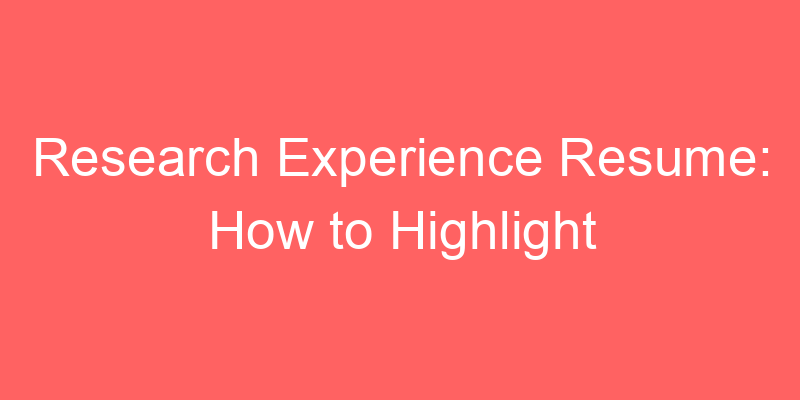Research Experience Resume
Understanding the Importance of a Research Experience Resume
When delving into the job market, your resume becomes your initial introduction to potential employers. A well-crafted research experience resume not only showcases your academic achievements but also highlights your practical skills and suitability for roles in academia, industry research, or even consultancy.
Key Components of a Research Experience Resume
Your research experience resume should begin with a concise summary outlining your academic background and any specialized skills relevant to your field of study. Include detailed descriptions of your research projects, methodologies used, and outcomes achieved. Highlight any publications, presentations, or awards that demonstrate your expertise and dedication.
Sample Resumes
| Resume Example 1 | An example of a research experience resume showcasing a blend of academic achievements and practical skills. |
|---|---|
| Resume Example 2 | Another example focusing on research methodologies and outcomes, suitable for academic or industry research positions. |
Resume Writing Tips
- Emphasize relevant research skills: Highlight skills such as data analysis, experimental design, and literature review.
- Use action verbs: Start bullet points with strong action verbs like “conducted,” “analyzed,” or “presented.”
- Customize for each application: Tailor your resume to match the specific job description and requirements.
Experience Highlights
Detail specific experiences that illustrate your research capabilities and contributions. For example, describe a project where you led a team in conducting field research, resulting in a breakthrough discovery published in a respected journal.
Professional Development Resources
| Resource | Description |
|---|---|
| Online Courses | Platforms like Coursera or edX offer courses in advanced research methodologies and data analysis. |
| Workshops | Participate in workshops focused on academic writing, grant proposal writing, and research ethics. |
Interview Preparation Questions
- How do you approach designing a research experiment from inception to conclusion?
- Can you describe a challenge you faced during a research project and how you overcame it?
- What methods do you use to ensure the validity and reliability of your research findings?
- How do you stay updated with current trends and developments in your field?
- Can you discuss a time when your research contributed to solving a real-world problem?
Skill Showcase
Highlight skills such as critical thinking, attention to detail, and problem-solving abilities. These skills are crucial in conducting thorough research and analyzing complex data sets.
Crafting a compelling research experience resume involves effectively communicating your academic achievements, practical skills, and passion for research. By emphasizing your unique contributions and showcasing your expertise, you can stand out to potential employers seeking talented researchers for their teams.
Research Experience Resume
Career Advice and Tips
Creating a compelling research experience resume requires careful consideration of your academic achievements, skills, and practical expertise. Highlight your research projects, publications, and technical skills prominently to showcase your suitability for research-focused roles. Tailor each resume to the specific job description to maximize relevance.
Emphasize your ability to conduct literature reviews, analyze data, and communicate findings effectively. Use clear and concise language to describe your research methodologies and outcomes. Quantify your achievements where possible, such as the number of publications, citations, or successful projects completed.
Networking within academic and professional circles can also significantly enhance your job prospects. Attend conferences, join relevant associations, and connect with researchers in your field to stay updated on industry trends and opportunities.
Resume FAQs
Q: How should I format my research experience resume to stand out?
A: Use a clean, professional layout with clearly defined sections for education, research experience, skills, and publications. Ensure readability by using bullet points and concise sentences. Tailor your resume for each application by highlighting relevant skills and experiences.
Q: Should I include research projects that are not directly related to the job I’m applying for?
A: Focus on projects that demonstrate skills relevant to the position. Briefly mention other projects in a separate section if they showcase additional strengths or diverse research interests.
Layout Tips
Structuring your research experience resume effectively can enhance readability and impact:
- Start with a clear objective or summary statement that highlights your career goals and key qualifications.
- Organize sections such as education, research experience, skills, publications, and awards in a logical sequence.
- Use bullet points to list responsibilities, achievements, and technical skills under each job or project.
- Incorporate keywords from the job description to pass through automated resume screening systems.
HR Insights
HR professionals value research experience resumes that demonstrate a candidate’s ability to contribute to scholarly or industry-focused projects. Highlighting collaboration skills, analytical thinking, and problem-solving abilities can make your resume stand out. Tailor your application materials to each job description to show how your research experience aligns with the employer’s needs and expectations.
Employers often seek candidates who can bring innovative solutions and fresh perspectives to their teams. Use your resume to showcase your unique research contributions and demonstrate your potential impact on future projects.
`
Generate Your NEXT Resume with AI
Accelerate your resume crafting with the AI Resume Builder. Create personalized resume summaries in seconds.




